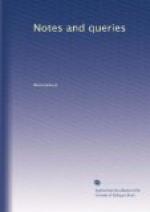“Fair stood the wind for France,”
is to be found in the very rare volume with the following title, Poemes Lyrick and Pastorall, Odes, Eglogs, The Man in the Moon, by Michael Drayton, Esquire. At London, printed by R.B. for N.L. and J. Flaskett. 12mo. (No date, but circa 1600.)
I think the odes are given in the other volumes of the early editions of Drayton’s Miscellaneous Poems; but I speak without book, my collection being in the country.
The selection from Herrick, noticed by Mr. Milner Barry, was made by Dr. Nott of Bristol, whose initials, J.N., are on the title page. “The head and front of my offending” is the Preface of Mr. Pickering’s neat edition of Herrick in 1846.
S.W.S.
March 12. 1850.
["O.E.” informs us that these pretty lines form No. CCXXXIX. of A Collection of Epigrams. London. Printed for J. Walthoe, 1727, and of which a second volume was published in 1737; and “J.B.M.” adds, that they are also to be found in the Encyclopaedia of Wit, published about half a century since.]
Teneber Wednesday.—In Hall’s Chronicle, under the date of 23rd Hen. VIII., is this passage:
“When Ester began to draw nere, the Parliament for that tyme ended, and was proroged till the last day of Marche, in the next yere. In the Parliament aforesayde was an Acte made that whosoeuer dyd poyson any persone, shoulde be boyled in hote water to the death; which Acte was made bicause one Richard Roose, int the Parliament tyme, had poysoned dyuers persons at the Bishop of Rochester’s place, which Richard, according to the same Acte, was boyled in Smythfelde the Teneber-Wednysday following, to the terrible example of all other.”
I conjecture that Teneber Wednesday is the Wednesday next before Easter, of “Feria quarta majoris Hebdomadao,” and that the name is derived form the Gospel for that day according to the ritual of the Church of Rome.
“Erat autem fere hora
sexta, et tenebroe factoe sunt in
universam terram usque in
horam nonam. Et obscuratus est sol: et
velum templi seissum est medium.”—Luke,
xxiii. 44, 45.
Should this conjecture be ill founded, I shall be glad to see it corrected; at any rate, I shall be obliged if any of your correspondents can supply other instances of the use of the term, or state what are or were the ceremonies peculiar to the day.
C.H. COOPER
Cambridge, April 4. 1850.
P.S. Since the above was written, I have noticed that “Tenable Wednesday” occurs three times in the Ordinance for “weshing of all mannar of Lynnon belonging to my Lordes Chapell” in the Northumberland Household Book (pp. 243, 244.). In each instance it is placed between Lady Day and Easter Even.




